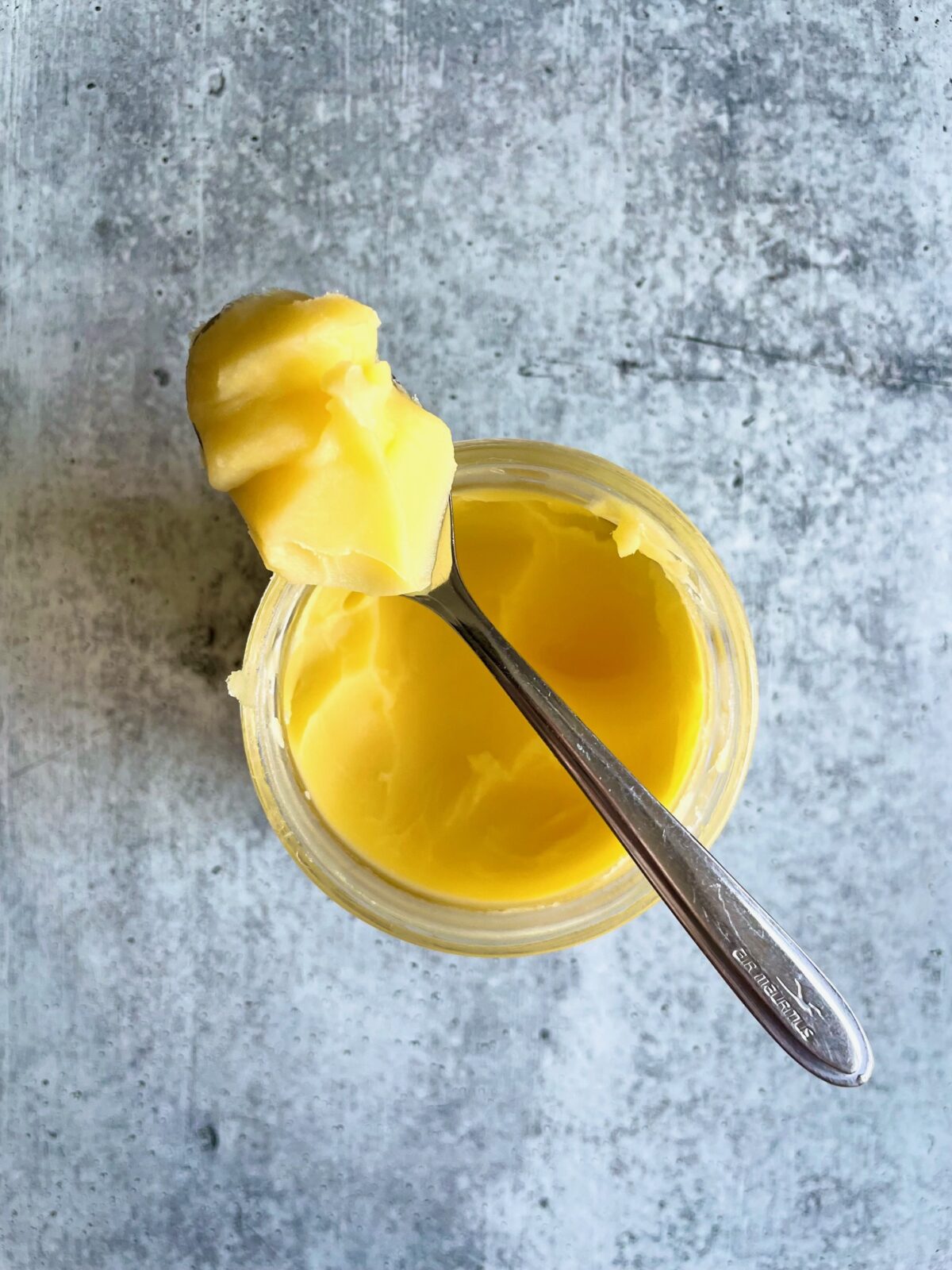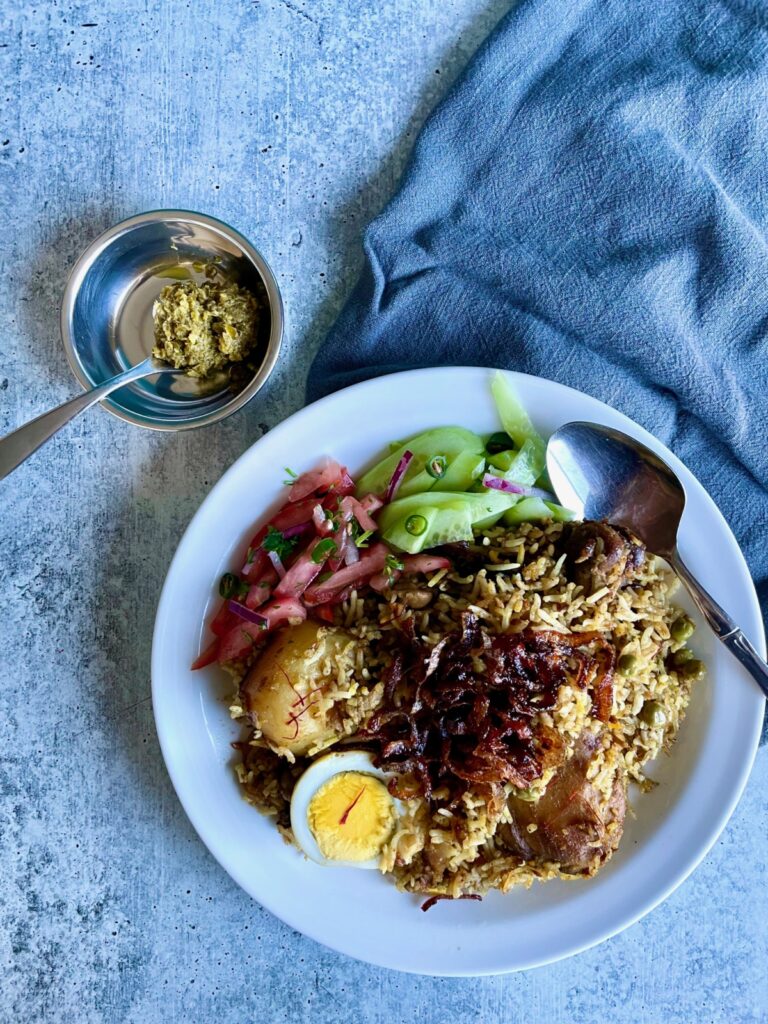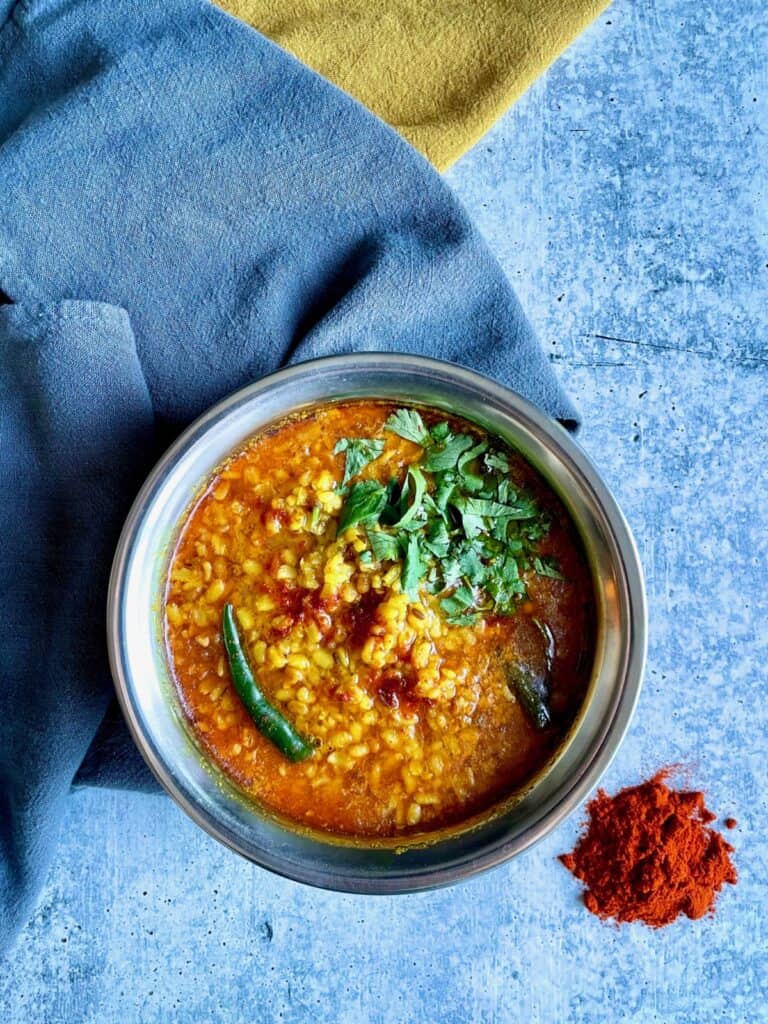Let's dive into the nooks and crannies of ghee and answer the question: is ghee ok for a dairy allergy! When navigating the complex world of dietary needs, especially for those with dairy allergies, the question of whether ghee is a safe alternative becomes paramount.
Ghee, a type of clarified butter, has been a staple in culinary traditions worldwide, notably in Hindu tradition and Sri Lankan cooking. It's praised not just for its rich, nutty flavor and high smoke point, making it ideal for deep-frying and sautéing, but also for its health benefits. However, for individuals with dairy allergies, understanding the nuances of ghee's compatibility is crucial.

Disclaimer: All information in this blog post is through research of my own and my personal experience. Although I'm lactose intolerant, I'm not a medical professional. Please consult with your doctor before making any changes to your diet.
Jump to:
What is ghee?
Ghee is made by simmering traditional butter to separate liquid fats and milk solids from the butter oil, resulting in a product that has a higher smoke point than most vegetable oils, including coconut oil, olive oil, and avocado oil.
This process not only gives off a distinctive taste but also removes most of the lactose and milk proteins found in regular butter, which is why it makes for such a potential option for those with lactose intolerance or a sensitivity to milk proteins.
However, the suitability of ghee for those with a dairy allergy requires a closer examination. Why? Because even though ghee is made from butter, its production process removes most of the dairy components.
Is ghee safe for dairy allergies?
The answer to whether ghee is safe for those with a dairy allergy is not a simple yes or no. It depends on each individual's level of sensitivity and the quality of the ghee itself.
For those with a severe dairy allergy, it is recommended by Cleveland Clinic Research to avoid all forms of dairy, including ghee. This is because trace amounts of milk proteins may still remain in ghee, which can trigger an allergic reaction.
Additionally, cross-contamination during manufacturing or storage can also occur, making it risky for those with a severe allergy.
On the other hand, for individuals who have a milder dairy sensitivity, ghee may be suitable as a dairy substitute. This is because the production process of ghee removes most of the milk solids and leaves behind only pure butterfat.
However, it is important to note that some people with a milder sensitivity may still experience adverse reactions to ghee.
When considering whether ghee is safe for those with a dairy allergy, it's crucial to choose high-quality, pure ghee from reputable sources like Pure Indian Foods. Some manufacturers may add in other ingredients or use low-quality butter, which can increase the risk of triggering an allergic reaction.
Dairy allergy vs. lactose intolerance
It's vital to distinguish between lactose intolerance and a cow’s milk allergy. Lactose intolerance involves the digestive system's inability to break down lactose, a sugar found in milk and milk products, due to a deficiency in lactic acid.
In contrast, a dairy or cow's milk allergy is an immune system reaction to milk protein that can lead to a severe allergic reaction, including in severe cases, anaphylaxis.
This reaction can occur in response to the milk of other mammals, including goat’s milk and buffalo milk, not just cow milk. It's essential to understand the difference between these two conditions as they require different management strategies, according to this Harvard study.
Symptoms of Dairy Allergy
A dairy allergy can cause a range of symptoms, including skin reactions like hives or eczema, digestive issues like nausea, vomiting, and diarrhea, respiratory problems such as coughing or wheezing, and in severe cases, anaphylaxis.
These symptoms can occur within minutes or up to hours after consuming milk products. For some people with a dairy allergy, even small amounts of milk can trigger a reaction.
It's crucial to seek immediate medical attention if you experience any severe symptoms after consuming dairy products.
Symptoms of lactose intolerance
Lactose intolerance, on the other hand, is a digestive disorder that occurs when your body doesn't produce enough lactase enzyme to break down lactose, a sugar found in milk and dairy products.
The symptoms of lactose intolerance can vary depending on the amount of lactose consumed and can include bloating, gas, abdominal pain, and diarrhea. Unlike a dairy allergy, lactose intolerance does not involve an immune system response and is not life-threatening.
Ghee and dairy allergy
Ghee contains trace amounts of lactose and milk proteins, which are often the culprits behind food allergies and dairy intolerance. For those with a dairy allergy, even these minimal amounts can potentially trigger an immune response.
However, some individuals with a dairy allergy may tolerate ghee due to its low levels of milk proteins and lactose, courtesy of the clarification process that removes most milk solids.
Yet, there's little evidence to broadly recommend ghee as safe for everyone with a dairy allergy. My recommendation? To consult with a healthcare professional before consuming ghee if you have a dairy allergy.
Ghee and lactose intolerance
On the other hand, those with lactose intolerance may be able to consume ghee without experiencing any digestive issues. The clarification process used in making ghee removes most of the lactose, which is the sugar found in milk.
This means that ghee is typically well-tolerated by those who are lactose intolerant. However, it's always best to listen to your body and start with small amounts of ghee before incorporating it fully into your diet.
If you do experience any symptoms such as bloating or gas after consuming ghee, it's recommended to avoid it altogether.
Benefits of ghee for overall health
Ghee is rich in conjugated linoleic acid and healthy fats, which can offer various health benefits, including a possible reduction in the risk of heart disease, as suggested by the National Institute of Diabetes and Digestive and Kidney Diseases. Its high content of butyrate, a short-chain fatty acid, can support the health of the digestive tract and reduce inflammation.
The presence of fat-soluble vitamins and its higher smoke point compared to traditional butter and many oils make it a great alternative for cooking at high temperatures, reducing the formation of free radicals known to harm the body.
It's rich in fat-soluble vitamins such as A, D, E, and K, which are essential for maintaining healthy skin and eyesight, supporting immune function, and aiding in calcium absorption. Ghee, like coconut oil, also contains medium-chain triglycerides (MCTs), which are easily digestible fats that can provide a quick source of energy.
In addition, ghee is high in butyric acid, a type of short-chain fatty acid that has anti-inflammatory properties and may support gut health by promoting the growth of beneficial bacteria.
Some studies have also shown that consuming ghee may help improve cholesterol levels and reduce the risk of heart disease.
But not all ghee is created equal. It's important to choose a high-quality, organic ghee made from grass-fed cows to ensure that it contains the most nutrients and is free from harmful chemicals and additives.
Considerations and cooking fat alternatives
For those who must avoid ghee, there are several dairy-free and vegan alternatives that mimic its rich flavor and cooking properties, such as:
- Coconut oil
- Olive oil
- Avocado oil
These oils offer similar health benefits, including healthy fats and a high smoke point, making them suitable for various cooking methods.
Reading food labels
For individuals with dairy allergies, scrutinizing food labels is essential to avoid inadvertent exposure to dairy products. Food manufacturers are required to list possible sources of milk in their products, but the classification of ghee can vary.
Some labels might mention ghee as anhydrous milk fat, butter oil, or clarified butter, highlighting the importance of recognizing these terms.
Is ghee ok for dairy allergy? Your ultimate guide
While ghee offers many health benefits and is a staple in various traditional ways of cooking, its suitability for individuals with a dairy allergy varies.
The good news is that many people with lactose intolerance or a mild sensitivity to milk products can enjoy ghee without adverse effects, thanks to its low amounts of lactose and milk protein.
However, for those with a cow's milk allergy, caution is advised, and alternatives should be explored. Ultimately, the best way to determine if ghee is a safe option is through careful testing under the guidance of a health professional.
My recipes using ghee
My favorite way to use ghee is the traditional way with a delicious biryani. I have a foolproof Mauritian Chicken Biryani on my sister blog that is sure to please a crowd. Ghee is also wonderful in my Typical Bengali Moong Dal.
I hope you enjoy these recipes that makes the best of this nutritious fat!




Leave a Reply